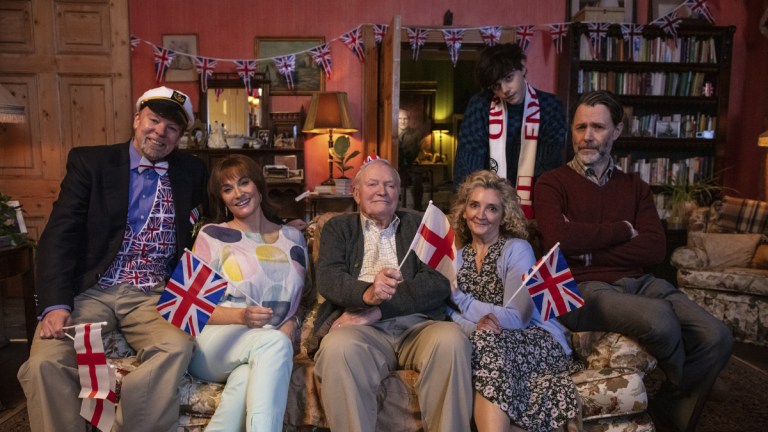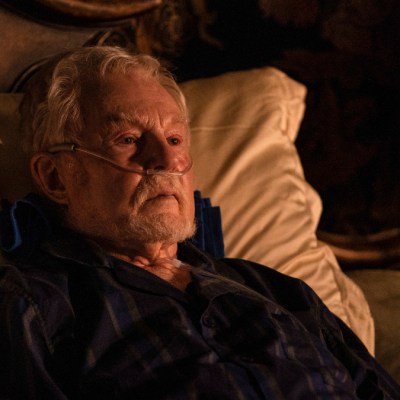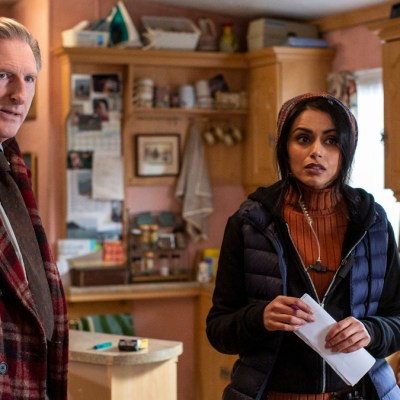Inside No. 9 Series 6 Episode 6 Review: Last Night of the Proms
Inside No. 9 leans into its 1970s Play For Today inspiration with Brexit Britain episode ‘Last Night of the Proms’. Spoilers.

This Inside No. 9 review contains spoilers.
Beheading, drowning, strangulation, throat-slitting, cannibalism, exsanguination, human sacrifice, dead babies… Practically nothing makes Inside No. 9 flinch. Let’s not forget, its first ever episode was a tale of historical child sexual abuse that ended in mass murder – which might explain why it took Bafta six series to finally award it ‘Best Comedy’.
It’s only the arrival of Inside No. 9’s first overtly political episode that marks out how apolitical the show has been until now. Of all the uncomfortable places it’s ventured, the state of the nation has stayed largely unexplored territory. Now it’s making up for lost time with a tale of Brexit Britain that belatedly takes up the full mantle of its 1970s Play For Today predecessor. In that strand, Barry Hines, Jim Allen, Ken Loach and others regularly put the country on screen alongside more fanciful, experimental plays from writers like Dennis Potter. ‘Last Night of the Proms’ blends Potter-ish fantasy, Hines-ish politics, and the cringe comedy of Mike Leigh classic ‘Abigail’s Party’, playing out as a tribute to all of the above.
Set in a Somerset country pile, the episode features the excellent Sarah Parish as leave-voting family matriarch Dawn, who’s married to Steve Pemberton’s buffoonish and cheerful Mick. Debra Gillett is Penny, Dawn’s sexually frustrated sister who’s unhappily married to Reece Shearsmith’s monstrous remain-voting pedant Brian, and mother to their teenage son Oliver, played by Jack Wolfe. Julian Glover is Dawn and Penny’s dementia-suffering father Ralph (whose Tourette’s-like interjections are, somewhat tastelessly, used here as punchlines).
The story plays out over a single evening at a Last Night of the Proms family viewing party. Mick’s having a high old time, Dawn’s trying to herd everybody into the spirit, Penny’s lonely, Oliver’s bored, Ralph’s in a world of his own, and Brian’s spitting hostility in every direction and drowning in booze. Into this mix walks Yusef, a mysterious non-English-speaking interloper (played by Bamshad Abedi-Amin), thought to have found his way there from a local immigration detention centre.
Parish is the episode’s star, and a match for Shearsmith’s brilliantly vicious energy. His character Brian starts off as a mere wanker (as summed up by one of Ralph’s eruptions) but ends up as a real villain. When Yusef arrives, Brian is shown to be more xenophobic and abusive than any of them. His high-minded criticism of ‘Little Englanders’ is revealed as hypocrisy when he uses a DNA test to crowingly evict Dawn from the family home after learning that she’s not Ralph’s biological daughter and half-German. When an insensible Ralph, whipped into a paranoid frenzy sound-tracked by ‘Land of Hope and Glory’, stabs Yusef, Brian leaps off his moral high ground and sticks the knife in too. Prior to that, he takes advantage of an opportunity to molest Yusef, much as his wife did during ‘The Sailor’s Hornpipe’ sequence. Wrapping Brian’s villainy up in his identity as a closeted gay man feels uncomfortably retrograde, but then again, nobody’s a hero in this episode.
Making the remainer character a total prick is perhaps a conciliatory attempt to armour the episode against accusations of left-wing BBC bias, but by the end, there’s no disguising the political perspective. The episode is an uncompromising look at post-Brexit UK identity and division. First, it paints a picture of the specific version of Britishness that inspires people to wave flags, hang bunting and congratulate themselves on being part of glorious British tradition. And then… it shows them murdering an illegal immigrant who might just be Jesus (Yusef looks the part, turns water into wine, miraculously restores an eaten buffet, has stigmata, and appears in a vision to Penny after his death – there’s the Dennis Potter fabulation), before they dispose of his body wrapped in a Union Flag. Well, why pussy-foot around.
I say ‘uncompromising’, perhaps ‘emphatic’ is better. Most our-national-flag-is-soaked-in-blood protest isn’t made quite so literally, but this certainly gets the job done.
There are some laughs amid the drama and hostility. Pemberton’s Mick is a cuddly racist whose relationship with Dawn is endearing. The Royle Family meets Gogglebox trick of cutting between actual footage of the proms, and the family’s commentary and unfolding story is a great ruse that leads to some exhilarating musical chaos from director Matt Lipsey and co. Comedy clearly isn’t the main goal here though, as the reflective, low-key ending shows.
The psychic wounds, if that’s the right way to describe them, of the last few years in the UK have pushed plenty of us to more political engagement. It’s no surprise that Inside No. 9 has been moved to do the same. When people age, we either mellow from the firebrand passions of youth or enter a new era of boldness. Maturing TV series are no different, it seems, and judging from this episode and the whole of series six, mellowing is not on this ever-vital show’s agenda. Here’s to series seven.
All episodes of Inside No. 9 series 6 are currently available to stream on BBC iPlayer.


